What STEM Actually Is: A Zakaria Rebuttal
A MiddleWeb Blog
A lot of what makes you succeed in life is not related to STEM. They are things like how to think clearly, how to express yourself clearly, how to write clearly, and the ability to place things in context.” — Fareed Zakaria in PCMag
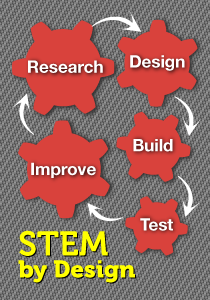
If Evan Dashevsky, Features Editor for PCMag, has characterized Mr. Zakaria’s views accurately, then Mr. Z, in his enthusiasm for the humanities, has again misrepresented STEM – at least K-12 STEM.
It’s scary to think how much misinformation about STEM one article (or one famous individual) can put out, and how many people may be misled as a result. That’s why I’m tackling this one.
I realize that a former science teacher and STEM curriculum writer taking on someone as eloquent and prolific as Mr. Zakaria is like a mouse going up against an elephant. But, here goes, anyway – because an accurate understanding of STEM is essential for a strong education system.
Let’s tackle four misconceptions that this PCMag article floats with regard to STEM – especially STEM in the K-12 community where I have put in a lot of “class time” in the past several decades. (See my definition of STEM.)
STEM is not indifferent to humanity
1. The article labels STEM as a cold, hard, and rational curriculum. I’ll bet that’s a surprise to the inventive, curious, and inspired folks who drive the progress in STEM education and related job fields. Many of them spend their lives creating solutions for problems that affect humanity worldwide – solutions that require a broad understanding of people as well as things.
As our students focus on the real and formidable challenges in areas such as health, environmental issues, and failing infrastructure, they generally develop genuine concern, empathy, and a desire to solve these problems that touch others. Yes, STEM is definitely rational; but “cold” and “hard?” Those are highly unlikely descriptors for folks in STEM fields. STEM positions are filled with many caring, inspired, and imaginative people.
Clarity of thought not related to STEM?!
2. Mr. Zakaria states, “A lot of what makes you succeed in life is not related to STEM. They are things like how to think clearly, how to express yourself clearly, how to write clearly, and the ability to place things in context.” Say what? Those skills are actually at the core of any STEM project.
Do STEM kids need to clearly communicate orally and in writing, art, and reading? Of course they do. And they must place engineering challenges in context as a necessary first step to solving problems (not to mention understanding the context in which technologies they create will be used).
In actuality, STEM naturally includes thinking skills, literacy, art, clear communication, and putting things in context. In contrast to Mr. Zakaria’s premise, most of what makes us succeed in life relates powerfully to STEM.
STEM ≠ Computers
3. Mr. Zakaria equates STEM with computers. In discussing STEM and the humanities he remarks that “computers are able to do some of those rote, repetitive skills that people used to learn technical skills for. But what a computer can’t do is be human.”
Consider this: STEM goes way beyond computers. It engages students in science, technology, engineering, and math as they exist in everyday life – interwoven and integrated. Any one of those subjects, taught in isolation, is not STEM. Computers are technological devices used in STEM projects, just as they are often used in humanities lessons and projects, and over at CNN.
Also, the “T” in STEM goes well beyond computers. Technology is any device created to satisfy a human need or want. Through STEM, students can learn how to use old and new technologies, understand how new technologies come about, develop technologies of their own, and analyze how specific technologies affect us and others.
Technology, in one form or another, is woven throughout STEM in combination with math and science to engineer solutions for problems. It’s something beyond using a computer.
Good STEM strengthens soft skills
4. Mr. Zakaria implies that STEM does not address the creative skills, soft skills, contextual skills, and the ability to work together. He asserts, “These soft skills are not things you easily pick up in an engineering or biology class.” Well, that probably depends on the teacher. But remember that engineering alone is not STEM; and biology alone is not STEM.
When kids combine what they learn in biology and engineering in a STEM project to collaboratively address, create, and design solutions for a real problem, they build a strong toolkit of those aptitudes. STEM education intentionally and consistently develops and rewards curiosity, creativity, self-direction, problem-solving, decision-making, collaboration, innovation, and communication – to name just a few skills. It’s an area rich with human interaction skills.
Mr. Zakaria also notes: “And the final part is the ability to work together. People have to want to work with you.” So, here’s the good news for Mr. Z. Students regularly work in teams during STEM projects and build social skills as they learn how to interact successfully and productively.
STEM education needs the humanities
This article got a lot of things right. Mr. Zakaria mentioned that the sweet spot is marrying the technical with the liberal arts. Absolutely on target!
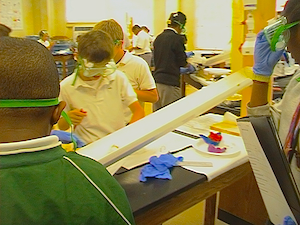
Student teams investigate watershed pollution solutions.
If Mr. Zakaria’s goal, as the article says, is really “to put global socio-economic forces in context and translate them for the average person,” then folks like Mr. Z will need to get out into STEM classrooms and rethink their narrow understanding of what’s going on. Yes, they will find educators who fail to grasp the true vision of STEM education and need to be called to task. But criticize the execution, not the concept.
The humanities are in no way short-changed by STEM education. They are not something different from STEM education. They are absolutely necessary to STEM education. This is not an either-or situation. And there are many more reasonable defenses for funding and promoting the humanities than misrepresenting STEM or any other subject.
So now I’ve added my two cents to the subject, and as someone who began as a liberal arts major and is the mother of a classical musician, I say, “Go STEM + Humanities!”
Feature image: Jack Andraka from “Teen Inventors Who Are Changing the World.”

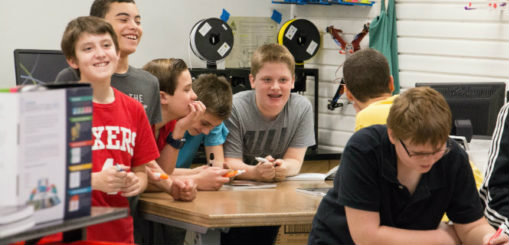

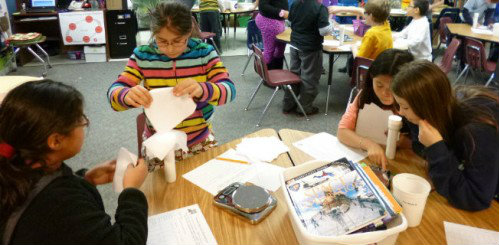
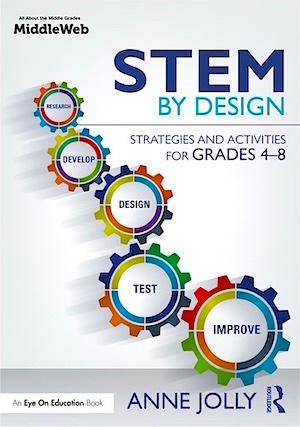




























I certainly hope STEM educators believe as you do that kids need “to clearly communicate orally,” but I fear there is absolutely no specific instruction given to make that happen. Making students talk as an afterthought to some project does not teach them how to talk well. My thoughts and many resources are here: https://goo.gl/AatgBD
What a great website, Erik! It’s so good to make contact with others who are passionate about teaching and learning.
You make some good points. STEM classes aren’t places where language arts skills are taught. K-12 STEM is strictly focused on integrating math and science to solve specific problems. I taught between 150 and 180 students per day during any given year so I had my hands full just leading science classes and STEM projects.
While I did teach textual reading in science, I turned to an outstanding language arts teacher for help with communication and writing issues. We taught the same students, so we could work together to support each other when needed.
The other subject areas are so important to student success, and should never be ignored or pushed into the background. My only push-back to Mr. Z. is that he is misrepresenting STEM (and has been representing it for a couple of years).
Thanks for chiming in, sharing your website, and making an excellent point about communication.
My question is, are kids learning History and Philosophy in Social Studies? Some states don’t test Social Studies. Knowing religion, history and philosophy is part of being well educated. I would have loved PBL as a student but sooner or later we have to know historical facts so we don’t repeat horrible mistakes. We have to understand philosophy and, dare I say religion, so we can make moral decisions with our unlimited science and technology knowledge. Are we allowing ourselves to be so dazzled by the possibilities available to us in science and technology that we are disregarding well considered boundaries. I am not comfortable turning education over to Google and Apple?
You are absolutely on target with your thinking, in my opinion, Chrissie. I hope that students everywhere are learning a lot about history and philosophy through social studies! I was spellbound by the stories my history teachers taught, and see the value in an increased focus on social studies every time I turn on the news.
The humanities have an important role to play in education. My concern was simply that Mr. Z. was again misrepresenting (and even seemed to belittle) STEM. I see no point in that. I hope I was able to clarify what STEM actually is.
Thanks so much for your response. I especially liked your question, “Are we allowing ourselves to be so dazzled by the possibilities available to us in science and technology . . .” You know, I think we are. And that may grow into a another real problem that we have to solve.
While I agree with your points about what STEM *can* be, I’m not sure Zakaria is that far off the mark for what is happening in a lot of classrooms/schools that claim themselves as STEM. Basically, it’s computers and engineering tasks, whenever I’ve seen it. Which are great! But there is a real sense among humanities teachers (as you can see in the other comments) that parents and administrators are perfectly willing to trash the humanities for STEM.
Why does it feel like that? Because school time and money is a zero-sum game. If they’re truly doing great STEM, it should incorporate math and science and come from math/science time. But in many schools (including my own), it’s coming out of Humanities time (mostly social studies) which is a huge problem.
It also points to a fundamental difference in the purpose of public education. If you think the purpose is to make great employees, STEM is great! If you think the purpose is to make great citizens, then suddenly Social Studies feels more important. If you want both, then you’ll have to do a better job playing with the schedule and the curriculum than many schools do.
Great points, LT. I have certainly seen my share of capricious commitments to various content areas by state and district decision-makers and principals. For example, throughout my teaching profession the value (i.e. “usefulness”) of science changed periodically based on (1) what was tested and (2) what was being funded by big federal grants. So I know how wrong it felt when science was being ignored.
I’m not sure when I last saw federal grants to schools for investment in humanities, civics, history, media literacy, or the arts. And our public schools are the only places in this nation where people of all nationalities and ethnicities come to prepare for our future together. Think of the important role social studies and the humanities play in creating our society!
The humanities have unquestionable value for all students. And I can strongly support the humanities while being passionately dedicated to STEM. The value of STEM goes way beyond preparing kids for a workforce. It can prepare thoughtful, productive citizens. And successful STEM will never happen without the humanities.
I do think that it’s important for the humanities to be proactive and promote the value of the arts, languages, social studies, etc. However, I do not think it’s necessary to demean or distort STEM to do that (as Mr. Z did). Articles such as the one I addressed in my post actually promote misconceptions such as “STEM is computers,” which you mentioned is happening.
As far as STEM time coming out of time for other subjects – you make a good point. In some schools, teachers from the humanities work with STEM teachers on projects and the kids find value in “real” connections among their content areas. Take a quick look at this post – http://bit.ly/2j2JcdZ – to see more about that idea.
I do hope that the time spent on STEM work (which is certainly a science/math initiative) does not continue to cut into your own class time unless it helps you to accomplish your objectives as well. No class should be forced to serve another.
Thanks for your thoughtful response!